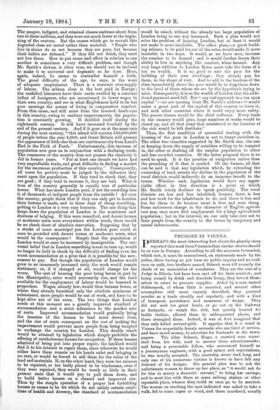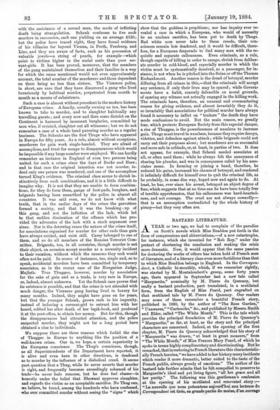THUGGEE IN VIENNA.
pERHA.PS the most interesting fact about the ghastly story reported this week fromVienna is that similar stories should be so rare in Europe. According to all the accounts forwarded, which rest, it must be remembered, on statements made by the police, there having as yet been no public inquiry and no evid- ence on oath, two brothers named Schenk were till recently the chiefs of an association of murderers. They are the sons ef a Judge in Silesia, but have been cast off for their conduct ; and being ruined by drink and dissolute. living, they betook them- selves to crime to procure supplies. Aided by a man named Schlossarek, of whom little is recorded, and several other accomplices still more vaguely described, they pursued murder as a trade steadily and regularly, and with a kind of bourgeois persistence and meanness of design. They did not seek for great hauls, or go out on the highway as footpads, or watch the rich, but quietly hunted for feeble victims, allured them to unfrequented places, and there strangled them. Indeed, it was at first imagined that they only killed servant-girls. It appelirs that it is usual in Vienna for respectable female servants who are tired of service, and have saved money, to advertise for husbands in the news- papers. The elder Schenk, Hugo, a married man separ- ated from his wife, used to answer these advertisements ; and being a personable fellow, who announced himself as a journeyman engineer, with a good salary and expectations, he was usually accepted. The courtship never took long, and only one of his numerous victims is known to have felt any distrust of his designs. His general plan was to ask the unfortunate woman to throw up her place, as "it would not do for him to marry a domestic servant," to bring her savings, and to meet him with them at some railway station or other reputable place, whence they could at once go to be married. The woman on reaching the spot indicated was asked to take a walk, led to some copse or wood, and there murdered, usually with.the assistance of a second man, the mode of inflicting death being strangulation. Schenk confesses to five such murders in succession, each one yielding on an average £120; but the police have traced eight, they have found evidence of his villanies far beyond Vienna, in Pesth, Presburg, and Linz, and they are aware of facts, such as his possession of valuable jewels—a string of• pearls, for example—which point to victims higher in the social scale than poor ser- vant-girls. It has been proved, moreover, that the members of the gang maintained themselves and their families in a way for which the sums mentioned would not even approximately account, the total number of the murderers and those dependent on them being no less than sixteen. The Viennese police, in short, are sure that they have discovered a gang who lived luxuriously by habitual murder, perpetrated from month to month as a means of subsistence.
Such a case is almost without precedent in the modern history of European crime. A family, usually owning an inn, has been known to take to murder, and to slaughter habitually any travelling guests ; and every now and then some district on the Continent is harassed by incessant burglaries, committed by men who, if resisted, slaughter out all witnesses ; but we do not remember a case of a whole band pursuing murder as a regular business. The Schenks are the first Thugs who have appeared in Europe for fifty years. As a rule, almost without exceptions, murderers for gain work single-handed. They are afraid of accomplices, and trust for escape to disappearances which would be impossible if any large number were employed. We can hardly remember an instance in England of even two persons being united for such a crime since the days of Burke and Hare ; and in that case the original intention was not murder, in- deed only one person was murdered, and one of the accomplices turned King's evidence. The criminal class seems to shrink in- stinctively from such combinations, and it is a little difficult to imagine why. It is not that they are unable to form combina- tions, for they do form them, gangs of foot-pads, burglars, and brigands having been unearthed by the police in almost all countries. It was said even, we do not know with what truth, that in the earlier days of the crime the garrotters formed a society, and that it was the breaking - up of this gang, and not the infliction of the lash, which led to that sudden diminution of the offence which has pro- vided the advocates of the lash with a stock argument ever since. Nor is the deterring cause the nature of the crime itself, for associations organised for murder for other ends than gain have always existed, and exist still. Carey belonged to one of them, and so do all members of the Russian Terrorist Com- mittee. Brigands, too, in all countries, though murder is not their object, on occasion accept murder as a necessity incident to their vocation, without which the ransoms they seek would often not be paid. In scores of instances, too, single and, so to speak, accidental murders have been committed by temporary associates, as in the recent case of the Hungarian Judge, Majlath. True Thuggee, however, murder by association for the sake of gain and as a trade, is very rare in Europe, or, indeed, almost unknown. Yet the Schenk case proves that its existence is possible, and that the crime is not attended with much danger, the Viennese gang having lived in luxury for many months. Indeed, they might have gone on for years, but that the younger Schenk, grown rash in his impunity, instead of inducing a servant-girl to entrust him with her hoard, robbed her after death of her bank-book, and produced it at the post-office, to obtain her money. But for-this, though the disappearances had attracted attention, and the police suspected murder, they might not for a long period have obtained a clue to individuals.
We suppose there are three reasons which forbid the rise of Thuggee in Europe to anything like the position of a well-known crime. One is, we hope, a certain superiority in the European conscience. The Thug's conscience, though, as all Superintendents of the Department have reported, it is alive and even keen in other directions, is deadened as to murder by the influence of a diabolical creed. It seems past question that a Thug, while he never asserts that murder is right, and frequently becomes exceedingly ashamed of his trade—he never feels remorse, but he does feel shame—is honestly under the belief that Bhowani approves slaughter, and regards the victim as an acceptable sacrifice. No Thug can, we believe, be found, among the hundreds who have confessed, who ever committed murder without seeing the " signs " which show that the goddess is propitious ; nor has inquiry ever re- vealed a case in which a European, who would of necessity be an unclean sacrifice, has been put to death by Thugs. Bad white men never take to these creeds, their con- sciences remain legs deadened, and it would be difficult, there- fore, for a European desperado to find many men with the re- quisite and separate callousness. Even criminals, as a rule, though capable of killing in order to escape, shrink from deliber- ate murder in cold-blood, and especially murder in which the victim must be systematically deceived, as a passenger, for in- stance, is not when he is pitched into the Seine or off the Thames Embankment. Another reason is the dread of betrayal, murder differing from all crimes in this,—that the criminals will accept any sentence, if only their lives may be spared ; while Govern- ments have a habit, scarcely defensible on moral grounds, of sparing any witness not actually engaged in the killing work. The criminals have, therefore, an unusual and overmastering reason for giving evidence, and almost invariably they do it, so invariably that associations for political murder have always found it necessary to inflict on " traitors " the death they have made confessions to avoid. But the main reason, we greatly fear, which protects European Society from this especial danger, a rise of Thuggee, is the powerlessness of numbers to increase gain. Thugs must travel in numbers, because they require decoys, videttes, and defenders against attack ; while brigands could not carry out their purposes alone ; but murderers are as successful and more safe in solitude, or, at least, in parties of two. It does not appear, for example, that Schenk needed associates at all, or often used them; while he always felt the annoyance of sharing his plunder, and was in consequence called by his asso- ciates mean. In forming or joining a band, therefore, he reduced his gains, increased his chance of betrayal, and rendered it infinitely difficult for himself ever to quit the criminal life, as he probably, in some dim way, hoped now and again to do. At least, he has, ever since his arrest, betrayed an abject degree of fear, which suggests that at no time can he have been totally free of terrible apprehension, that his callousness was hard-hearted- ness, and not courage. The cruel are not always cowardly— that is an assumption contradicted by the whole history of piracy—but they very often are.



































 Previous page
Previous page